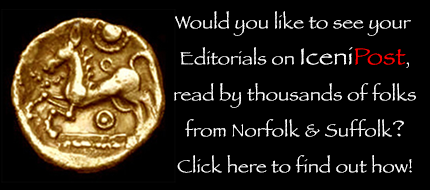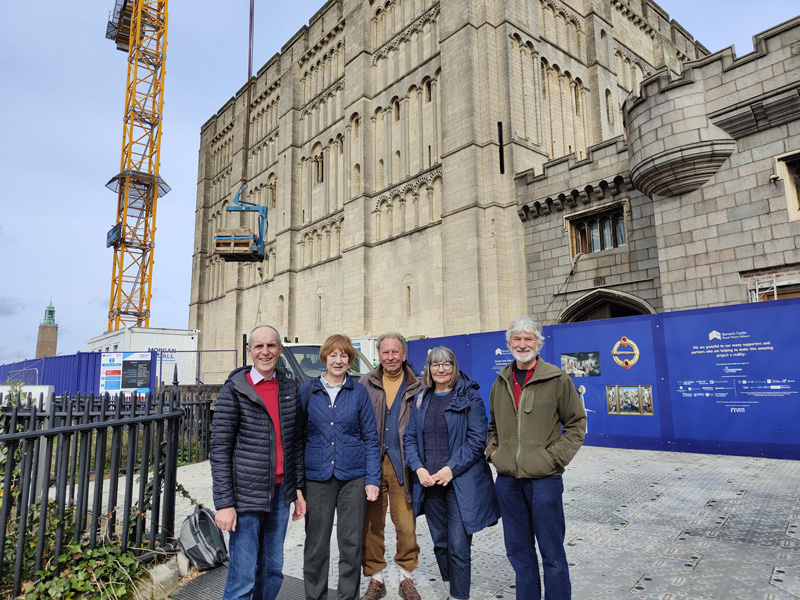Return to Bungay Fair May 14th
from The Sun in the East
edited by Richard Barnes
“The sun was shining both sides of the hedges and Bungay May Fair was close at hand, which the celebrities were looking forward to, thinking they’d have some fun and see the Boss’s pony and cart sold, and take a hand in running up the price”. – from the Rabbit Skin Cap. Ask any old man what he remembers about Bungay May Fair and the chances are you’ll have to wait for the laughter to subside before he actually tells you anything.
Then he might tell you about the old chimney sweep who bought a pony that kicked the bottom out of his cart halfway down Bungay high street! And blind Joe Kitt, standing beside the fairground gate with his wind-up gramophone and his old lady and his enamel begging bowl…and carts and horses and sticks of rock and bonnetted ladies.
May 14th was, for hundreds of years, a very special day in Bungay; a high day, fixed in the calendar and only to be moved if the 14th fell on the seventh day.
 It was an English country fair. Horse-dealers Romanies, didekais and rogues – they travelled miles at the sniff of a deal, probable stopping at a forge on the road to Bungay to get a lame horse lamed in the other leg, just to balance things up a bit! It seems that many a horse touched up with shoe-black changed hands at Bungay Fair.
It was an English country fair. Horse-dealers Romanies, didekais and rogues – they travelled miles at the sniff of a deal, probable stopping at a forge on the road to Bungay to get a lame horse lamed in the other leg, just to balance things up a bit! It seems that many a horse touched up with shoe-black changed hands at Bungay Fair.
There was other livestock too and an auction was always held on the morning of the 14th. There would also be ‘dead-stock’ – mainly carts and harness – and quite a bit of barter on the side! At one time, Bungay was probably a hiring fair too, with local farmers taking on the best men to work their land through the coming seasons – “On Lady Day the old men say, today you’re lost or found.”
Business apart, Bungay Fair was a gathering, a ribald meeting of friends and foes, a blow-out – and one of the few available during the whole year to hardworked and poorly laid farm labourers. There are stories of farm-workers from surrounding villages walking miles to Bungay on May Day, with new-bonnetted wives and scrubbed children. And, at the end of the day, the whole family, probable the worse for wear, would walk home again.
The fair was held at Skinner’s Farm, at the bottom of St. John’s Road, for as long as anyone remembers, although it may well have taken place on the Common at an earlier date. John Baldry, author of The Rabbit Skin Cap, wrote “Then come the 14th May – Bungay May Fair day – which had been held that day for seven hundred years, so my father always told me. He wouldn’t have missed Bungay May Fair – it being the only day out he had in the whole year.”
There was usually a boxing booth at the fair and 70 year-old Mr. John Davey of Ditchingham can recall the feats of local worthies like Porky Ward and Tom Smith, battling to last three rounds against a six-foot negro in order to win £1!
Apart from the clamour and gaiety down on Skinner’s Farm, the effect of the day on the town itself must have been remarkable. The pubs were open all day, horses galloped in the streets…it was because of this that Bungay schools were always closed on the 14th whenever it fell during the week.
According to Mrs. Mary Spinks, wife of the retired Ellingham blacksmith, it was simply too dangerous for children to be on the streets on May Fair day; horse-dealers would give their ponies trial gallops up and down the High Street to impress potential buyers – “so Bungay children were always hoping the 14th would fall on a week-day so they could have a day off school.”
 It was the Great Day, the different day. Bungay was bedlam. Everyone was in showbiz Hoppy Glutton, Lardy Cracknell, Blind Joe Kitt and all…
It was the Great Day, the different day. Bungay was bedlam. Everyone was in showbiz Hoppy Glutton, Lardy Cracknell, Blind Joe Kitt and all…
In 1934, the last Bungay Fair was held and no-one seems to know exactly why. Mr. H. White, the retired Bungay newsagent, worked as a clerk for Sidney J. Owles, who was the May Fair auctioneer up until the outbreak of the first World War. He remembers being at the fairground at 6.30 on the morning of the 14th to begin a very important day’s clerking.
In Mr. White’s opinion, Bungay Fair was never quite the same after the war; he thinks the closure of Bungay’s weekly livestock market, combined with the decreasing numbers of livestock, may have something to do with the Fair’s disappearance from the calendar (it used to be listed in Old Moore’s Almanac too!)
But, for better or for worse, Bungay lost its fair and, some ten years later, the April race meeting on the Common went too – and the place has never been the same since.
Now there’s a Bungay Fair again, at Mettingham Castle, two miles from the town, on May 15th and 16th. Horses, fiddle music, woodsmoke into the night… (WAVENEY CLARION c1970s)
For more great info about local fairs visit
www.fairsarchive.org.uk









